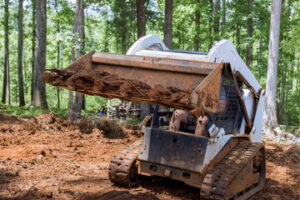Excavation Contractors lay the groundwork for construction projects across communities. Using specialized knowledge, sophisticated equipment and careful planning, they ensure the very foundation on which new buildings and infrastructure are built.

These contractors offer a wide variety of services, including land clearing, earthmoving and more. When hiring an excavation contractor, ask about their licensing and insurance coverage to make sure they are reputable and adhere to strict safety protocols. Visit Website to learn more.
Often the first group to arrive on the construction site, excavating contractors set the stage for the stability and success of future building efforts. Their work involves far more than simply moving dirt, including a host of other tasks that help prepare the land for new infrastructure like roads, buildings, and utilities. Their work also impacts the speed and efficiency of the project, and helps prevent costly errors that can derail projects later on.
Preparation typically includes clearing the land of debris and waste materials, removing or disposing of any hazardous items, and grading the area for construction purposes. They may also need to create a drainage system for the job. Using heavy equipment like backhoes, bulldozers, or dump trucks they can open up space, flatten and even the ground surface, and create a slope for water runoff.
When it comes to residential or commercial paving, excavation contractors are the experts. They can dig, grade, or tarp your driveway or parking lot, improving its function and curb appeal. They also specialize in constructing and repairing asphalt surfaces, laying concrete, and installing underground sewer systems.
Contractors that specialize in excavation must market themselves as being the best choice for a project over other local companies that offer similar services. To stand out, they need to have a proven track record of quality work and a reputation for excellence. A great way to gauge their reputation is through online reviews and references from previous clients.
Before starting any work, a contractor must properly prepare the area for excavation. This involves setting corner benchmarks, clearing the land with equipment like bulldozers and excavators, and marking the top and bottom of the dig. They must then clear away any existing structures and make sure the dig is within a safe distance from any underground utilities. If the soil has been contaminated with harmful substances, excavating contractors can apply methods like soil washing or encapsulation to remediate the issue before beginning the build. This is especially important in urban and industrial areas where environmental damage has occurred in the past.
Excavation
Unlike other construction professionals who focus on building structures once the site is ready to proceed, excavation contractors are often among the first professionals to arrive at a construction project, preparing the ground for all future building activities. Their specialized skills in land development, including digging, shaping, and grading the soil, are instrumental to a construction project’s stability and success.
Excavation services are often performed by heavy machinery, such as bulldozers and backhoes. This type of equipment can be dangerous and cause costly damage if not operated by a licensed professional who understands the best practices for safety and efficiency. These contractors are also responsible for removing debris and disposing of waste material at the construction site. This includes the removal of concrete, metal and other unwanted materials from the site.
The first step of the excavation process involves assessing the site and providing insights based on soil analysis and topographical surveys, giving contractors the information they need to prepare the area for construction. During this stage, the excavation contractor will recommend strategies for site preparation, such as identifying potential challenges like the consistency of soil and the presence of underground utilities.
Next comes the actual digging part of the job, which requires a lot of skill and patience to safely remove large amounts of dirt from a construction site. Depending on the size of the site, this may involve hand digging or a variety of machine-driven methods. Once the site is bare, an excavation contractor will then transform it into a buildable space, laying down the foundation for the construction of homes, roads and other infrastructure projects.
During this phase, an excavation contractor will also perform other critical construction tasks, such as grading the site to ensure that it is flat and has the correct slope for stability, and installing utilities. While many companies offer excavation and construction services, it’s important to choose a company that is experienced and reputable, as it will ensure that the job is done right the first time around. If you’re considering hiring an excavation company, be sure to get several estimates from different contractors before making a decision. This will help you determine which one is the best fit for your construction needs and budget.
Obtaining Permits
When hiring an excavation contractor, it’s important to know which permits they need to pull before getting started. Some contractors ask property owners to pull permits as part of their job, while others handle the entire process in-house. This ensures that all parties are on the same page and doesn’t delay the project due to misunderstandings.
Local utility companies may need to be notified before digging begins. This ensures that gas, power, water and other essential infrastructure won’t be accidentally cut or damaged. This also helps to prevent accidents that could be very dangerous for workers and the public alike.
Depending on the project, it’s possible that environmental exposures will need to be addressed as well. This can include sediment, water runoff, and other pollutants that could damage nearby ecosystems and waterways. Excavators can take measures to mitigate these risks by implementing erosion control and stabilization techniques.
Many excavation projects require a significant amount of digging. This is usually done in order to create foundations for buildings or trenches for utilities. As such, it’s important for the contractor to understand the risks associated with this type of work and have the proper safety protocols in place. This includes a clear understanding of proper handing techniques, as well as a comprehensive review of all equipment and procedures to avoid potential hazards.
While some excavation contractors offer a wide range of services, others focus on specific tasks such as digging foundations and trenches or installing septic systems. When choosing a contractor, it’s recommended to choose one with extensive experience and an established reputation for quality workmanship. Asking for client references and assessing their portfolio for comparable jobs can help you determine which excavation contractor is best suited to meet your specific project requirements.
Licensing and insurance are another important factor to consider when choosing an excavation contractor. Ensure the contractor has a valid construction license and liability and worker’s compensation insurance to protect you from financial loss should an accident occur during the course of the project. Additionally, it’s crucial to inquire about the contractor’s safety record and training programs to ensure they’re committed to ensuring all workers follow strict safety protocol.
Integrating Vital Infrastructure
Despite their seemingly mundane duties, excavation contractors are a vital part of construction projects. They do much more than simply dig through dirt, preparing the site for building foundations and ensuring that all essential infrastructure is in place before construction begins. They also perform other critical services, such as site planning and clearing, transforming raw land into a buildable lot while balancing ecological concerns with the need for development.
Excavation is a complex process, involving numerous issues like groundwater management and unexpected soil conditions. To tackle these challenges, professionals use advanced planning, leveraging experience to anticipate problems and implement solutions that ensure project success. They use technology such as ground-penetrating radar to avoid utilities and implement soil management techniques that ensure stability. They also work in conjunction with environmental experts to deliver eco-friendly solutions.
As the need for renovations and redevelopment continues to grow, excavation contractors are in high demand. Choosing the right contractor for the job is crucial to guarantee the safety and success of the project. To select the best candidate, property owners should consider the following factors:
Does the Excavating Contractor Need A Permit?
Some excavation companies may require property owners to be a part of the permit application process. Others may take care of all necessary permits and inspections in-house. To avoid miscommunication, it is best to choose a company that will be upfront about the requirements of your particular project.
The contractor should be able to explain the type of equipment they will bring on the site. Moreover, the contractor should be able to provide an accurate estimate of the cost of the project. It is also important to check whether the contractor has an insurance policy that covers damages incurred during the excavation process.
During the excavation process, erosion control is necessary to prevent sediments from polluting nearby waterways. This is done through the use of silt fences, sediment basins, and erosion control blankets. These measures protect the topsoil, which is rich in organic matter and nutrients. The contractor must also ensure that the area is free of buried debris and hazardous waste before beginning the next phase of the project.


